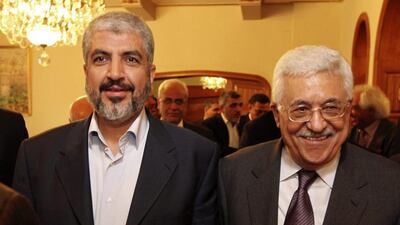GAZA CITY // Palestinian president Mahmoud Abbas is to unveil a unity government by on Thursday, ending seven years of rival administrations in the West Bank and Gaza Strip, an official said.
“We have finished consultations on the national consensus government,” Azzam Al Ahmed, an envoy from Abbas’s Fatah movement, said on Tuesday after talks in Gaza with its Hamas rulers.
“The announcement will come from the president in the next two days.”
The Palestine Liberation Organisation, which is dominated by Fatah, signed a surprise reconciliation deal with Hamas on April 23, giving the two sides five weeks to draw up an “independent government” of technocrats headed by Mr Abbas.
Prime minister Rami Hamdallah of the West Bank-based Palestinian Authority is to head the new government, an official said on Thursday.
Hamas, which has its own Gaza prime minister, Ismail Haniya, saying it had “no objection” to the decision.
Agreement on a unity government would pave the way for long-delayed presidential and parliamentary elections.
Hamas won a landslide victory in the last parliamentary polls, in 2006.
But the European Union and the United States have refused to have any dealings with the Islamist movement until it renounces violence and recognises Israel and past peace deals.
Representatives of the rival factions have held several rounds of talks to heal the bad blood since Hamas expelled Fatah from Gaza in deadly clashes in 2007.
The two sides signed reconciliation deals in Cairo in 2011 and Doha in 2012, but neither accord was implemented.
Hamas enjoyed Egypt’s support under president Mohammed Morsi of the Muslim Brotherhood, but has been under unprecedented pressure from Cairo since the army removed Mr Morsi in July and squeezed the besieged Strip, closing the Rafah border crossing and destroying tunnels used to bring in crucial supplies.
“Contacts are ongoing with Egypt over the Rafah crossing, and there will be steps to review this after the government is formed,” Mr Al Ahmed said.
Gaza suffered its worst fuel crisis ever after Egypt destroyed the tunnels last year. At the same time, rights groups warn that residents cannot get proper access to medical care given restrictions on movement through both Rafah and Erez, the Israeli-controlled personnel crossing in the north of the Strip.
The reconciliation deal incensed Israel, putting the final nail in the coffin of US-brokered peace talks between the Jewish state and Mr Abbas’s West Bank-based leadership.
Washington has insisted that any Palestinian government must commit “unambiguously” to the principles of non-violence and to the existence of Israel, referring to Hamas’s refusal to recognise Israel and advocating an armed struggle against it.
* Agence France-Presse

